A Copasa
Therefore, I feel proud and accomplished to be part of this company that not only provides me brilliant achievements, but also helps the rivers of my story to follow their courses.
Copasa
Vision 2017
Be a reference in business management at the national sanitation market with the highest number of assistance in the operating area.
Vision 2030
Being a global company and a landmark in the sanitation sector.
Mission
Providing solutions in water supply, sanitation and solid waste, creating value for customers, shareholders, employees and society in a sustainable manner.
Values
- Ethics and transparency in relations.
- Social and environmental responsibility.
- Valuing employees.
- Quality of services provided.
- Proud to be Copasa.
- Innovation and entrepreneurship.
- Focus on customer satisfaction.
- Acting safely.
- Dissemination of knowledge.
- Sustainable growth.
Strategic Positioning
Maintain the standard of quality at the lowest possible cost, focusing on the pursuit of productive efficiency, expansion of production volume and minimizing expenses.
Message from Management
João Antônio
Fleury Teixeira
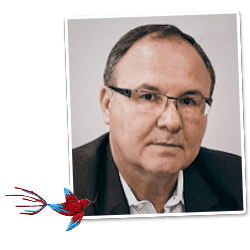
Message from the Chairman of the Board
(GRI 1.1)
ACopasa, mixed economy Company, was incorporated in 1963 as a Minas Company for Water and Sewage (Comag) and had its name changed to Sanitation Company of Minas Gerais (Copasa MG), by State Law No. 6.475 of November 14th, 1974. Since 2003, became a public company and in 2006, its shares were traded on the New Market segment of the São Paulo Stock Exchange (BM & FBOVESPA) and the Minas Gerais state as its majority shareholder.
In 2013, the state government, through Copasa launched the Ague da Genet program, the largest sanitation program in the history of Minas Gerais, which provides funds of approximately R$ 4.55 billion in improvement projects, expansion and implementation of water supply and sewage systems, to be invested by 2016.
In its first 50 years, the Company has consolidated its performance, contributing to improve the health and quality of life of the population in the state of Minas Gerais. The technical competence of our workforce is recognized by the market and our management practices based on the principles of social responsibility and sustainability have been awarded as a business excellence model. The recognition of the management model implemented in the Company as evidenced by the awards received in 2013, gives a winning sequence to this half century of life.
The Metropolitan Operation Board received the top recognition award in the latest edition of the National Quality Award in Sanitation (PNQS 2013), the Diamond Chiron Trophy, and the most important sanitation award in Latin America. PNQS is dedicated as a reference tool in the evaluation and continuous improvement of environmental sanitation services in the country. The Época Business Magazine Yearbook 360º awarded Copasa for the second year in a row as the Best Company in the Water and Sanitation Sector. The Value Award 1000 elected for the second time, as better Sanitation Company in Brazil and received an unprecedented award from the Você S/A magazine because of our policies and practices in Human Resources. In addition, for the fourth consecutive year, Copasa takes part in the portfolio of the BM & FBOVESPA Corporate Sustainability Index (ISE). This index aims to reflect the return on a portfolio composed of stocks of companies committed to sustainability and environmental responsibility, differentiating them in terms of quality, commitment to sustainable development, equity, transparency, nature of product, besides the economic performance dimensions -financial, social, and environmental and climate change.
Other important achievements relate to the expansion of coverage area and increased population served with the services provided by the company. We closed the year 2013 supplying treated water to a population of approximately 14.6 million people, which represents an increase of 3.4% compared to 2012, while the number of people served with sanitation services was approximately 9.3 million customers, 6.2% more than the number registered in 2012.
The year 2013 was very special to Copasa. When congratulating our employees for their achievements this year, we began to think about the challenges we must overcome to continue our sustainable growth, so that we can achieve our vision of future to be a reference in business management at the national sanitation market with the highest level of service in our area, contributing to the socio-economic and environmental development of society.
We began 2014 with estimated investments of R$ 983 million, for the expansion of water and collection and treatment of sewage services. We will speed up the implementation of our strategy, strengthen partnerships, continue to invest in people and create value for our stakeholders.
Ricardo Augusto
Simões Campos

Message from the CEO
(GRI 1.1)
In 2013, the year we completed 50 years, we continue to consolidate our benchmark for business excellence for a sustainable manner in order that we could overcome steps, perform undertakings and achieve results. We concluded the review cycle from strategic planning to articulate and set goals for the coming years, in a process involving all managers, welcoming and encouraging the participation of professionals from several areas of knowledge. We also reviewed our vision and mission and reinforced the values and principles that guide our actions in everyday life. It is a commitment of the Company with the way we deliver results, reaffirming our quest for efficiency and profitability.
Copasa ended the year 2013 with a net revenue from water and sewage at R$ 3.01 billion (not including construction revenue) and Adjusted Ebitda of R$ 1.14 billion. During the year, investments totaled up R $ 909.2 million, applied mainly in the collection and treatment of sewage (R$ 566.4 million) systems and water supply systems (R$ 321.5 million), which resulted in significant expansion of capacity of helping users with the services provided by the company. Still, three new concession contracts for the provision of health and renewed sewage services were signed in 12 municipal towns for water supply services. Also we started operating 14 new systems, three with water supply and 11 sewage services, especially in the city of Sabara, located in the Metropolitan Region of Belo Horizonte.
In relation to water supply, compared to 2012, the population served increased by almost half a million people (484,000), an increase of 3.4%, representing an audience of approximately 14.6 million people connected to the network distribution of treated water. Regarding sewage systems, significant developments, with an increase of over half a million people (543,000) who might have public sewage services, an increase of 6.2% and totaling approximately 9,3 million people to benefit from this service.
Advances in issues related to sewage treatment is an important milestone for the company and resulted in significant increase in the volume of treated sewage, reaching 237.3 billion liters, an increase of 12% compared to the year 2012. Among the main actions, there is the beginning of operation of 19 new Sewage Treatment stations (WWTP) in various cities in the state of Minas Gerais, among them: Conceição do Mato Dentro, Mirabela, Montalvânia, Salinas, Santa Luzia and Santa Rita do Sapucaí. The company ended the year 2013 with 148 stations in operation and 78 more under construction, scheduled for completion by 2016.
To meet the specific needs of smaller localities Human Development Index (HDI), Copasa expanded its operations in the northeastern region of the state of Minas Gerais, through its subsidiary Copasa Services Integrated Sanitation North and Northeast of Minas Gerais S / A (Copanor). The company ended the year 2013 providing water services in 198 systems, benefiting 283,000 people, and sewage systems in 61, benefiting 118,000 people.
We thank our colleagues and partners at Copasa, who contributed in their daily activities, with involvement and commitment to achieving the results that are part in this report. We hope to achieve our mission together with the foundation in the principles of sustainability, to build an even stronger company, contributing to the universalization of sanitation and improving the quality of life for people in our area of operation.
Key Indicators (Controller Data)
(GRI EC1)
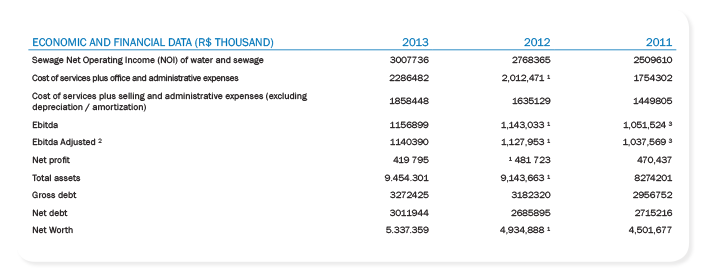



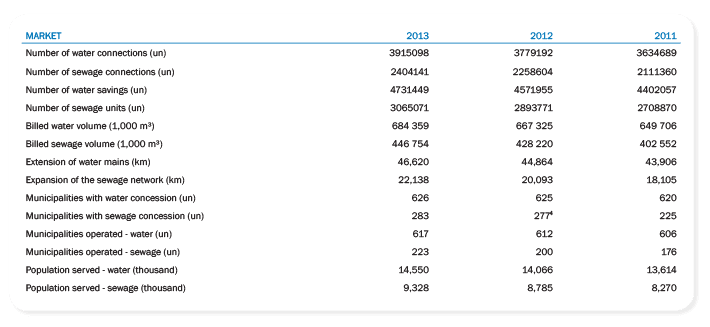
(GRI EN8)



Notes: 1 These values differ from published in 2012 due to accounting adjustments, as described in Explanatory Note 3.23 of the financial statements of 2013. 2 EBITDA is not an accounting measure prepared by the Company, calculated by observing the CVM Instruction No. 527/2012, consisting of net income plus income taxes, net interest income, depreciation, amortization and non-operating income of the Subsidiaries. The EBITDA margin is calculated on total revenue (net revenue from water and sewage revenues and construction, plus other operating income and revenue of Subsidiaries). Now the Adjusted EBITDA is calculated excluding revenues / costs of construction. Revenues from construction, although they have no effect immediate cash, generate implications in the year they are recognized, given that its outcome is part of the calculation basis for the payment of interest on capital / dividends and participation of employee profit sharing. 3 The values differ from those disclosed in the Annual Report 2011, due to change in calculation methodology. 4 In the Subsidiary Copanor number, 30 sewage concessions that had not been disclosed were included in release operating in December 2012 and which have a combined population of 97 000 inhabitants. Moreover, the number referring to the parent, were included four new sewage concessions signed in December 2012 that were not disclosed in release operating that month. 5 The number of outsourced employees is estimated considering the manpower allocated in service contracts, for Copasa does not hire third parties directly. 6 Values referring to resources released by the company by Tax Incentive Laws.
(GRI 3.10)
The History of Copasa
In order to define and implement a comprehensive policy for the basic sanitation in the state of Minas Gerais, on July 5, 1963, sanitation was established by State Law No. 2,842, the Comag. In 1971, another important step was taken in this story. The Federal Government established the National Sanitation Plan (Planasa), establishing the goals to be achieved by the country in the sanitation sector. From there, the Municipal Department of Water and Sewage Belo Horizonte (Demae), responsible for the provision of such services in the city of Belo Horizonte, was incorporated into Comag. This merge and the changes introduced by Planasa, especially the increase of technical and financial support to the work of the state sanitation companies, brought significant impetus to the growth of the Company. With this, Comag began to undergo a series of modifications to fit the needs of the sanitation of the state of Minas Gerais policy, among them, changing their name to Copasa MG, by Law No. 6.475/1974.
Currently, Copasa is a public traded company, regulated by the Corporations Act, a mixed economy, linked to State Department of Regional Development and Urban Policy of Minas Gerais (SEDRU). Acts as a concessionaire of the sanitation sector, developing activities that comprise the public services of water supply and sewage, including activities ranging from planning and preparation of projects to their implementation, expansion, remodeling and operation of sanitation services.
(GRI 2.1/GRI 2.2/GRI 2.5)
In 2006, the Company made its initial public offering (Initial Public Offering - IPO), joining the Novo Mercado of BM & FBovespa. In April 2008, it was made a second offering of shares in its entirety by the Municipality of Belo Horizonte and partly by the state of Minas Gerais, which retained the controlling interest.
In 2007, aiming to strengthen its presence in the market and take advantage of business opportunities, three subsidiaries were created: Copasa Mineral Waters of Minas Gerais, Copasa Services Irrigation and Copanor.
(GRI 2.2/GRI 2.3)
On July 5, 2013, the Company completed 50 years of existence, being recognized as a benchmark in business excellence in its industry, fulfilling its role of contributing to the development of the state of Minas Gerais and the quality of life of his people. In the year of the fiftieth anniversary of Copasa, to further leverage the sanitation sector, the government of Minas Gerais has launched the largest program of improvements in the state's history, the Água da Gente, ensuring investments in works of improvement and expansion of water supply and water and sanitation systems, including sewage treatment. The program will directly impact the quality of life and improve the urban infrastructure of the cities served by Copasa, as well as help restore and protect the major rivers of Minas Gerais, with the expansion of sewage collection and treatment programs.
Organizational Structure Copasa
(GRI 2.3)
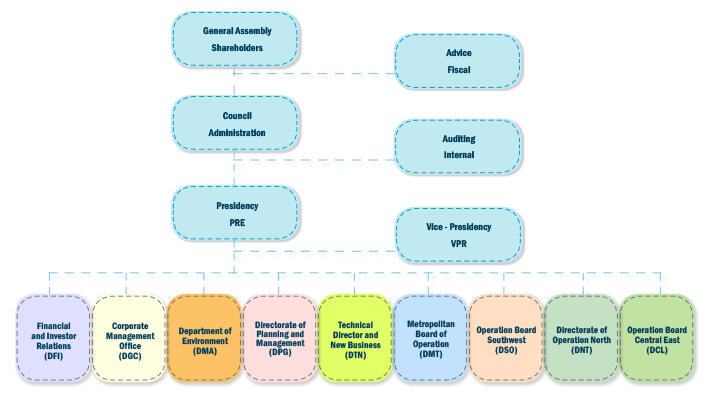
Subsidiaries
Copanor
Copanor is the concessionaire for the provision of water supply and sewage collection and treatment, with reduced tax in locations with low HDI and population between 200 and five thousand inhabitants in the region of the basins of Jequitinhonha, Mucuri, São Mateus, Buranhém, Itanhém and Jucuruçu, all of which are located in the north and northeast of the state of Minas Gerais, responsible for the execution of the Structuring Project of the Government of the State of Minas Gerais - Life in the Valley.
(GRI SO5)
With resources from the State of Minas Gerais, the Subsidiary maintains technological and organizational structures that allow for increasing the efficiency and reducing operating costs in the provision of sanitation services, enabling to maintain a tariff model compatible with a socio-economic reality of the region without compromising the quality of services. According to the report Studies and Models for Rural Sanitation, Prepared by the World Bank, Copanor's experience was chosen as one the models of the deployment and management of sanitation services in isolated communities in Brazil.
In December 2013, there were a total of 198 localities served with implanted water systems, benefiting 283,000 people and 61 cities with sewage systems, benefiting 118,000 people. In addition, 886 families were benefited from the implementation of sanitary modules with toilet tank, shower and sink in their homes. Until December 2013 out of the 92 counties that are part of the coverage area of Copanor, 88 already had the acquiring law passed and the program contracts signed by the mayors, allowing transfer of the municipal government services to Copanor.
In its first implementation stage, which corresponds to the region of valleys Jequitinhonha, Mucuri, Mateus Buranhém Itanhém and Jucuruçu, will be met by 2016, 463 cities with population between 200 and five thousand inhabitants, benefiting 400,000 people. Are the works in progress of implementation or adaptation of infrastructure in more than 150 locations and are already completed or in the final stages of approval, more than 110 projects of water and / or sewage, whose works are planned to be hired in the next years.
From 2007 until December 2013, was invested by the state government through Copanor, with funds from the State Treasury, the amount of R $ 423 million in sanitation, equipment, materials and services.
Copasa Mineral Water from Minas Gerais
The Subsidiary Copasa Mineral Waters of Minas Gerais was created by the government of Minas Gerais to promote the return of production, distribution and marketing of mineral water sources of cities of Caxambu, Cambuquira and Lambari, in the circuit of the waters of Minas Gerais, and also the sources in Araxá.
The Caxambu was the first bottled water to return to the market through the Subsidiary Copasa in 2008. The mineral water Cambuquira returned to the market in 2011. Araxá returned to the market in 2012. After completing the adaptation process for compliance with the requirements of regulators, as reported in the Sustainability Report 2012, the Lambari returned to the shelves in 2013, with the completion of the reform of the factory and suitability determinations to the National Health Surveillance Agency (ANVISA ) and the National Department of Mineral Production.
Since its inception, the subsidiary invested R$ 29.7 million, generating approximately 850 direct and indirect jobs. In 2013, it grew to its area of operation with the inclusion of new distributors, present, and Minas Gerais, São Paulo, Rio de Janeiro, Federal District, Goiás, Bahia, Ceará, Paraná and Santa Catarina, and packaged these units 3.1 million liters of mineral water.
The Cambuquira Caxambu and brands are the official water for the 11th edition of Madrid Fusion, an important event in world gastronomy held annually since 2002. The 11th edition was held in January 2013 in the Spanish capital, having as theme the cuisine of Minas Gerais.
Copasa Irrigation Services
Copasa Irrigation Services began its operations in March 2008 and since then, were performed investments in the amount of 7.5 million with funds from the State Treasury. These investments were directed towards improving the operational infrastructure and procurement of vehicles and equipment for Phase II of the Irrigation Project Jaíba.
In early 2013, the state government decided to transfer management of Irrigation System Phase II of Jaíba the Association of Irrigators Jaíba II (DIJ II), based on State Decree No. 46.080 of 12 / November 2012. As a result of this change, the subsidiary is in liquidation process.
Copasa in 2013
(GRI 2.8 /GRI 2.9)
Copasa finished the year with the supply of treated water to 14.6 million people in the state of Minas Gerais, having been made 136 000 new water connections and deployed 1756 km of new distribution networks, totaling 46,620 km. Also expanded the service with sewage services, and now serves 223 municipalities of Minas Gerais, benefiting 9.3 million people. The volume of treated sewage was 237.3 million cubic meters, which represents more than 12% higher than in 2012. This increase is due to the start-up of 19 new STPs.
Regulation of the sector
The regulation of public services in basic sanitation has an objective to guarantee the balance between the needs of users (for low tariffs, quality services and in proper amount), service providers (for economic and financial sustainability) and investors (for adequate remuneration of investments). In compliance with Federal Law 11.445/2007, the State Law No. 18,309, which establishes standards for water and sewage services, created the Regulatory Agency Services Supply Sewage and Water of the State of Minas General (ARSAE-MG), special autarchy linked to SEDRU.
Below are some deliberation published by ARSAE-MG in 2013:
- Technical Note nº 02: determine the cost of the free telephone service of the Company;
- Technical Note nº 04: Details calculation of the tariff adjustment Copasa index and determines an adjustment of 5.25%;
- Resolution nº 38: provides for the obligation of prior notification to the user in rate of change of tariff category or commencement of the provision of services;
- Resolution nº 40: defines the general conditions for the provision of public services of water and sanitation regulated;
- Consultation Paper No. 05: Objective contributions spoon to lay down the general conditions for the activities to be performed by laboratories of service providers.
In 2013, ARSAE-MG made 56 economic inspections, technical and commercial inspections to verify and assess the quality of services provided by Copasa.
Copasa participation in the state of Minas Gerais 1
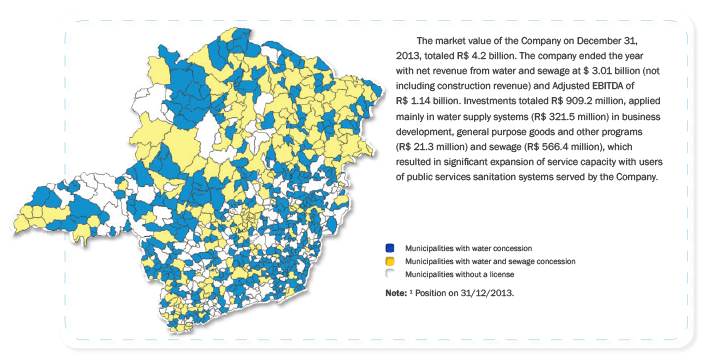
Concessions for water and sewage services
Fulfilling its institutional mission of being an agent of social and economic development of the state of Minas Gerais in 2013, Copasa expanded and ensured compliance in areas where it already operated and also expanded its market by signing new concessions for the provision of sewage services health in various municipal offices.
Astolfo Dutra, Camacho, Boundary Alegre, Forestry, Itamonte Itapeva, Great Pond, Marilac, Currency, New Modica, Nova and Santa Juliana Resende: concessions for the provision of water supply services in 12 municipal seats were renewed. Also during the year 2013, the Subsidiary Copanor assumed new concessions for the provision of water and sewage in municipal centers and several towns and villages supply services. A consolidated basis, Copasa arrived in late 2013 as a concessionaire for provision of water services in 626 municipalities and sewage in 283 municipalities, as shown below:

Note: 1 The municipalities that are not yet in operation are in works and/or end-stage investment
Technical Cooperation
Aiming to expand its market, Copasa develops technical cooperation activities with municipalities, sanitation companies and entities in the public and private sectors in Brazil and abroad. These activities are performed in the form of technical visits, technical assistance, consulting, getting an appropriate response to business modeling.
In 2013, in addition to receiving teams from various institutions and delegations from countries like England, Ethiopia, Mozambique and Morocco with the aim of benchmarking, in-service training or identifying prospective partners, Copasa met the demands of businesses such as: Basic Sanitation Company of the State of São Paulo (Sabesp), Sanitation Company of Pará (Cosanpa), Santense Spirit Sanitation Company (Cesan ), Companhia Vale do Rio Doce (Vale SA), Goiás Sanitation (Saneago), Self Service Water & Sewage Volta Redonda (AMSA Volta Redonda) and Municipal Water and Sewage Service of Ouro Preto (Black Gold Semae). Here are some details of these activities:
British mission: UK Trade & Investment (UKTI), the commercial department of the British government, organized a visit of a British mission technology for water management and solid waste, between September 30 and October 4, 2013. This delegation led by Minister Richard Benyon, the UK government responsible for Environment, Water and Rural Affairs, chose two Brazilian sanitation companies to be visited, one is Copasa, which presented to British entrepreneurs an institutional vision of the company, its investment plan and the stage of technological development. This visit ended with the expectation of stimulating technological exchange between the parties.
Ethiopian Delegation: stimulated by the World Bank, the director of the Department of Water and Sewage company Morrison Hershfield L'International Inc. (Canada), Mr. George Douglas McRae, organized the visit to Copasa a committee formed by technicians and politicians, all involved in a pilot project of sewage system in that country. The Ethiopian delegation was formed by the mayor of Addis Ababa, capital of Ethiopia, and the crew of the Addis Ababa Water and Sanitation Development and Rehabilitation Project Office (Ethiopia), totaling seven people. During the visit, to the Ethiopian institutional and physical structures of the company, focusing on sewage infrastructure in the city of Belo Horizonte, with technical visits to STPs Arrudas (CHP) and Onça were presented.
Delegation of the Government of Mozambique: the state government, through the Secretariat of State for Planning and Management of Minas Gerais (SEPLAG), formalized a technical cooperation agreement with the government of Mozambique, aimed at technical training and training of the teams involved in the specification, acquisition activities and implementing routines control inputs. With respect to materials for sanitation, Copasa was chosen to receive the teams and carry out the training on site. This training aimed at learning about macroflux shopping, specification, cataloging materials and governance catalog, involved the procurement team Copasa and was conducted in three stages during the month of November 2013.
Ministry of Finance: aiming at contributing to the modernization program of the management of the Ministry of Finance, the corporative management coordinator of the Economic Policy Secretariat requested visit benchmarking the Copasa, motivated by the awards received by the company, considered one of the best companies to work for in the country, the Guia Você S / A. The agenda of technical cooperation was focused on people management policy, detailing the issues highlighted by the Ministry of Finance team as of great importance to the improvement of its management process.
State Department of Social Defense (SEDS): aware of the need to change the process of managing people within the state agencies, generating returns as improving the organizational climate, improved productivity, reduced absenteeism and removal by disease, SEDS requested technical visit to Copasa to ascertain what programs were adopted by company. It was up to the Company, which has far-reaching practices among employees programs, making the transfer of methodologies adopted to the team responsible for human resources SEDS.
Modeling of Business Opportunities
Copasa is developing prospecting and modeling opportunities for business activities since 2011, seeking to expand the market performance and strengthening the company's image. In 2013, partnerships were structured as follows:
Foz do Brazil: Copasa is a partner of Foz do Brazil, with a minority share of 15.5% of the shares to take on a patterned design, construction and operation (which will be transferred after 17 years) of treatment of water and sewage systems, business electricity distribution and collection and disposal of solid waste from Steel Vallourec & Sumitomo Tubos do Brazil, in the city of Jeceaba. The return on this investment has surpassed anticipated in the work plan, thus proving the correctness of Copasa to innovate their way of acting and start a new business in the industrial field.
Public-private partnership - water system producer from the Tame River: public-private partnership in the form of an administrative concession for the expansion, maintenance and operation of the producer shared water system Manso River, one responsible for the integrated water system in the Metropolitan Region of Belo Horizonte supply, expanding its production capacity in more 1.8 m³/s. The total term of the concession will be 15 years, involving investments in civil works, equipment and projects, totaling approximately R$ 500.6 million needed for the provision of all infrastructure. The winner of the bidding process was Norberto Odebrecht.
Public-private partnership - the city sewage of the municipality of Divinópolis: public-private partnership in the form of an administrative concession for the deployment and partial operation of the sewage of the city of Divinópolis system in order to assist the program signed with the municipal government contract. The total term of the concession will be 27 years, involving investments in civil works, equipment and projects, totaling approximately R$ 202.5 million required for the provision of transport infrastructure and sewage treatment in the basins of rivers Itapecerica, Para and Hermitage. The partnership aims to meet the expansion of the collection and treatment of sewage to a percentage close to 95% of the population by the year 2022. The expected publication of the invitation to bid is to occur in the first half of 2014.
For 2014, are provided for new partnerships with the private sector, seeking to diversify the market performance of the company, which intends to operate in segments such as sewage reuse sewage treatment plants for industrial purposes, industrial sewage treatment, as well as obtaining strategic concessions in Minas Gerais and out of state.
Awards and Recognitions
(GRI 2.10)
Brazil-Germany Chamber: the cogeneration system of and biogas exploitation of ETE Arrudas was recognized with the von Martius Sustainability Award 2013 granted by the Brazil-Germany Chamber. This system aims to prevent polluting gases to be disposed in the environment as well as providing the use of the gas that is released during the process of sewage treatment.
Época Business 360º: after a thorough and unprecedented survey on the key dimensions of corporate governance in Brazil, the Era Business Yearbook 360º Copasa awarded for the second consecutive year as the Best Company in the Water and Sanitation Sector. Prepared in partnership with Fundação Dom Cabral and Boa Vista Services, the yearbook included six items: financial performance, corporate governance, innovation, forward thinking, human resource practices, and environmental responsibility.
Innovation in sanitation management: Copasa had the practice of shared management, developed in the North Operations Department, headquartered in Montes Claros, recognized by the Brazilian Association of Sanitary and Environmental Engineering, the tenth Seminar on Innovation Management Sanitation, held in Curitiba in November 2013. This objective referred practice achieving results through strategic operation of working groups, promoting the dissemination and improvement of best management practices.
Common Market: Copasa was ranked among the top 50 largest companies and the state of Minas Gerais, in the category Expression, and ninth place in the category Excellence in Minas Award Business Performance XV 2012/2013, sponsored by the magazine Common Market. Related to financial performance criteria such as growth in operating income, earnings before interest, taxes, depreciation and amortization, industry leadership, number of employees, equity, among others, were evaluated.
Business Communication: in an election organized by magazine Business Communication, Copasa was recognized for the third consecutive year as one of the companies best communicate with journalists, in the sanitation category. The award is based on a survey of 25,000 journalists from around the country, which elect three companies by market sector.
PNQS: the Board of Metropolitan Operating received the maximum recognition in the edition of PNQS 2013 - Chiron Diamond Trophy - Level IV - 1,000 points. The DMT was the largest unit to be recognized in the most important awards in the sanitation sector in Latin America. This award encourages businesses to invest in the sector managerial practices aimed at sustainability and competitiveness. Its main objective is to increase the performance of public or private, municipal or state, responsible for the provision of water, sewage, urban draining and solid waste services.
Corporate Sustainability: for the fourth consecutive year, Copasa composes the ISE portfolio of BM & FBOVESPA. This index aims to reflect the return on a portfolio composed of stocks of companies committed to sustainability, differentiating them in terms of quality, commitment to sustainable development, equity, transparency, product nature, beyond performance on economic and financial dimensions, social, environmental and climate change.
Economic Value: Valor 1000 Award Copasa elected as the best sanitation company in Brazil. Promoted by the newspaper Economic Value, The 13th edition of the yearbook, the results obtained in terms of net revenue, sustainable growth and value creation were evaluated, in addition to efficient and transparent management, corporate governance, social involvement and respect for the consumer and the environment.
S/A: Copasa was contemplated because of its human resources policies and is among the "Best Companies to Work For." The prize, awarded by the magazine S/A, The 17th edition brings the 150 companies that invest the most satisfaction and employee motivation. Copasa joined the list in the category of Public Institutions. The award is one of the most respected in the country and selects companies for excellence in the workplace, based on the evaluation of the employees themselves, whose opinion on various issues related to performance in human resource impacts, differently, in the result.
